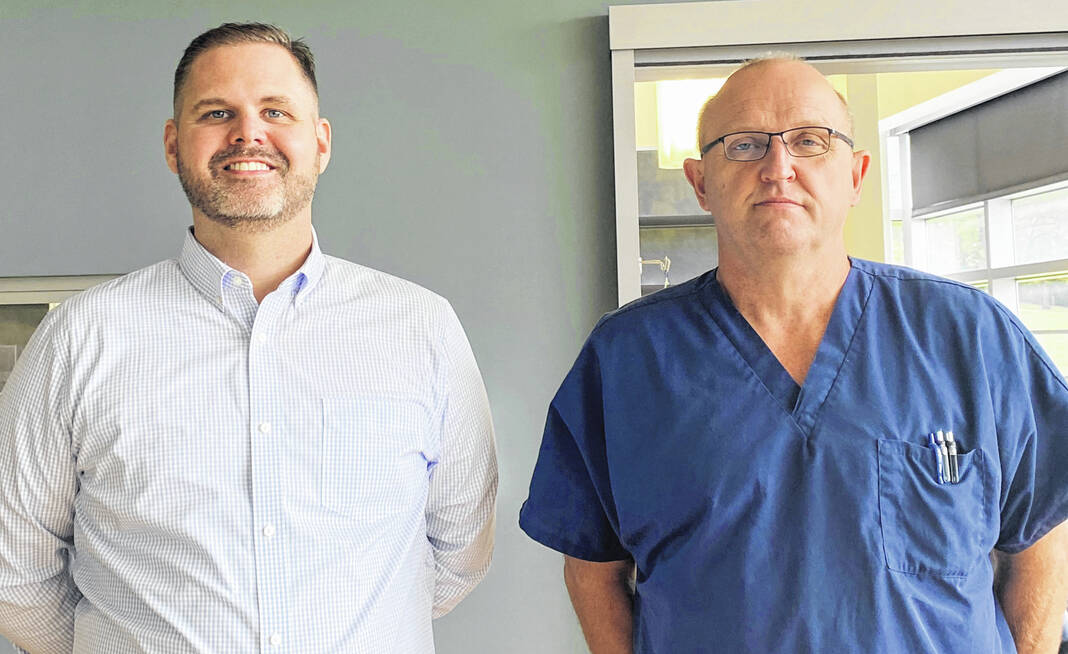
Dr. Alex Wilson, Adena medical director of oncology and radiation oncologist (left) and clinical nurse Ray Seitz were lauded for clinical trial participation levels.
Submitted photo
CHILLICOTHE — When it comes to a cancer diagnosis, one of the best available emotional weapons to fight the disease is hope.
The Adena Cancer Center, through its active participation in cancer care clinical trials, not only bolsters that hope for patients working toward a full recovery, but also empowers those same patients through their involvement to provide new avenues of hope for other cancer patients everywhere both now and into the future.
Participation in clinical trials provides patients with access to some of the most groundbreaking treatments available in the country – treatments on the cusp of formal approval by the U.S. Food and Drug Administration that have already been through extensive testing for safety and effectiveness before being used at Adena. They may involve new drugs coming on the market or new ways of delivering treatment for better patient outcomes.
“I think the most exciting thing about cancer care in general is that people are living longer with cancer and more people are being cured of cancer,” said Dr. Alex Wilson, medical director of oncology and radiation oncologist. “It’s being shown year over year that we’re improving and that many cancers can become a chronic illness that can be managed. That’s where many of these newer drugs like immunotherapy come into play, and patients who once would come in with a terminal diagnosis who would only live four to six months we sometimes now see come in for three, four, five years or more.”
Wilson recently was honored for enrolling the highest number of patients into clinical trials from among the more than a dozen institutions that make up the Columbus branch of the National Cancer Institute’s Community Clinical Oncology Research Program (NCORP). His colleague at the Adena Cancer Center, clinical nurse Ray Seitz, also was recognized for enrolling the highest number of patients in cancer care delivery research studies.
As of mid-October, the cancer center had 115 patients enrolled in one of the numerous available clinical trials it is involved with at any given time. Patients who may meet eligibility requirements for an available trial are identified through regular reviews of cancer cases conducted at the time of consultation. Those who meet the criteria to be considered, or whose condition suggests a clinical trial may be the best option for a positive outcome, are then brought in for a discussion about the trial, the accompanying consent form, and what to expect should they choose to take part in the trial.
It’s important, Wilson said, that they have a full understanding to counteract myths about such trials that patients may have heard. Seitz, he added, is very good at taking the time to help patients and their families gain that understanding.
“I try to break it down to the basic level so they understand, and usually, unless it’s something we have to get started quickly, I’ll send the consent home with them and let them review it with their family and call me with any questions just to make sure they understand what they are participating in,” Seitz said.
Clinical trials exist in three areas: Cancer control, which looks predominantly at prevention and screening; cancer treatment, which involves such things as new treatment drugs; and cancer care delivery, which looks to bridge gaps and disparities in care practices from community to community.
Among the more successful recent trials in which Adena has participated has been lung cancer screenings linked to smoking cessation. Not only has that trial produced information closely tied to meeting a real need in the Appalachian region, but the screenings done through the trial have also in some cases caught secondary cancers in participants that may otherwise have gone undetected.
There are two ways patients can become enrolled in a clinical trial. One is through being recognized by clinical staff as a possible participant and being asked to participate. The other is through the patient requesting whether a trial is available that may help provide a positive outcome for the condition from which he or she suffers.
The key, Dr. Wilson said, is making sure any trial considered is the best fit for the patient.
“When you open a trial, you want to make sure it’s not an inconvenience or an increased cost or problem for the patient and that it has a clear benefit as best as you can perceive it,” he said. “We look at that right from the beginning and if it’s something that may not be worth it, we’re not going to pursue that aggressively. Keeping the patient at the center of the clinical trial program is very important.”
Through Adena’s participation within NCORP, it is able to enroll patients in most of the same clinical trials that larger metropolitan systems offer, helping to eliminate transportation barriers that some patients may face by keeping them close to home to participate or receive treatment.
To learn more about services available at Adena Cancer Center, visit adena.org/cancer.
Submitted by Jason Gilham, manager external communications, Adena Health System.

